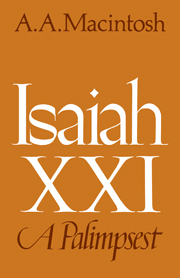2 - Exegesis and historical background
Published online by Cambridge University Press: 04 August 2010
Summary
Verses 1–10
As has been indicated in the textual commentary above, the rabbinic commentators ibn Janah, ibn Ezra and Rashi regard this prophecy in the light of Daniel v, and by reference to that text they interpret a number of the words and phrases of Isa. xxi 1–10. For these authorities, therefore, the prophecy as a whole concerns the fall of Belshazzar and the Babylonian empire at the hands of Darius the Mede. However, the legendary character of the book of Daniel together with the secondcentury date to which it is generally ascribed render such a comparison with the detailed deductions drawn from it highly questionable. It remains of value, however, as an indication that Jewish tradition from comparatively early times considered that the prophecy concerned the fall of the Neo-Babylonian empire, which we know to have taken place at the hands of Cyrus II of Persia in 539 B.C.
In general, this view of the prophecy is adopted by subsequent commentators. Thus, for example, Rosenmüller (1793) states that the prophecy was obviously delivered at the same time as that of Isa. xiii and concerns (see verse 9) the fall of Babylon at the hands of Cyrus. The contents of the prophecy, to the smallest detail, match exactly the accounts of that fall preserved in other ancient authors. It is for Rosenmuller beyond question that the poet (not, of course, Isaiah) was himself present in Babylon and witnessed in person the events that he describes.
- Type
- Chapter
- Information
- Isaiah XXIA palimpsest, pp. 63 - 102Publisher: Cambridge University PressPrint publication year: 1980



